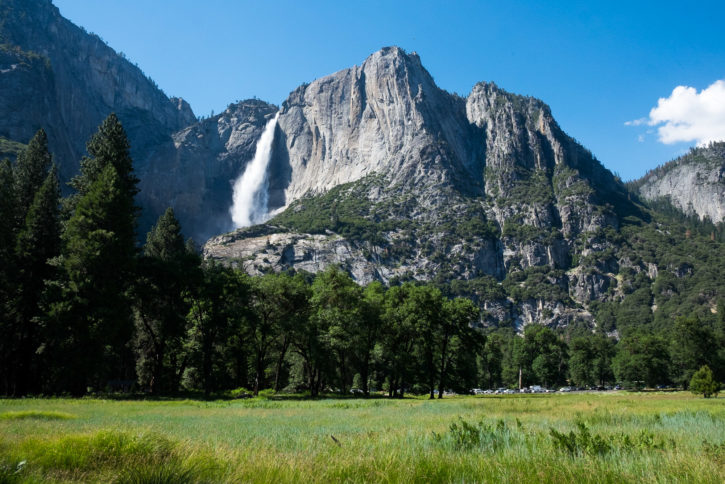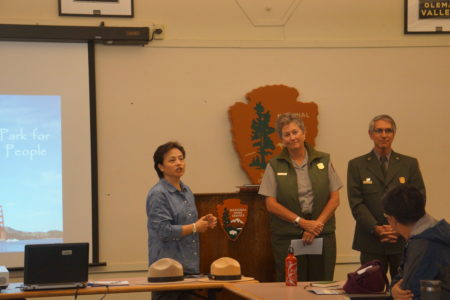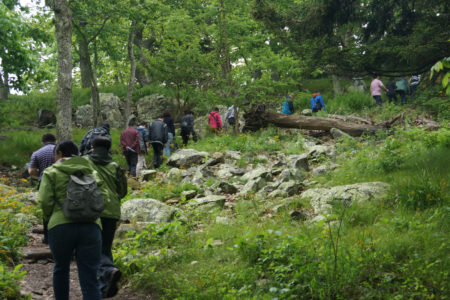By Rose Niu

It is the centennial of the U.S. National Park Service this year. What could be more opportune than for the Paulson Institute to host a visiting Chinese delegation in June on a two-week learning tour in the United States to study the national park system? This training program is a collaborative effort between the Paulson Institute, the U.S. National Park Service, Global Parks, and China’s National Development and Reform Commission (NDRC), with financial support from the Heren Foundation. The NDRC is the central Chinese government agency put in charge of creating China’s national park system, one of the key initiatives outlined in China’s recent ambitious plan to deepen reforms.
National parks are considered to be ‘America’s best idea.’ This may seem counter-intuitive, since America is usually better known for its scientific innovations and technological prowess—whether it’s great inventors such as Thomas Edison and Nikola Tesla, who helped catapult the humanity into the electric age, or it’s the engineering feats that built the Panama Canal, erected the Hoover Dam, and landed humans on the moon, or it’s the Internet and information technology that have ushered humanity into an interconnected virtual world. Each of these extraordinary achievements has had a profound impact on the world. And yet somehow national parks have claimed the title of ‘America’s best idea.’ The justification could be multifaceted, but the most compelling would be that national parks help people rediscover and rethink their connections with nature, connections that sustain and enrich humanity. Material achievements pale compared to these deeper connections. As biographer Donald Worster put it, national parks helped “save the American soul from total surrender to materialism.”

Nothing about America’s best idea should be taken for granted, however. The evolution of the U.S. national park system is a history of extraordinary individuals making monumental efforts to envision, initiate, defend, popularize, and improve the system in their own ways. John Muir, widely regarded as the ‘father of national parks,’ inspired and enlightened his fellow countrymen with poetic and thought-provoking writings, when the prevailing public opinion at the time still viewed wilderness as land to be redeemed through development and resource extraction. Muir’s passionate argument for nature earned him some very powerful allies, including President Theodore Roosevelt. Their legendary three-day camping trip together in Yosemite only strengthened their shared appreciation for wilderness and a sense of urgency to protect it. President Theodore Roosevelt eventually used his executive power through presidential proclamations to set aside more than 230 million acres of public land, including five national parks and 18 national monuments.
Stephen Mather, the first director of National Park Service (NPS), not only helped create this new federal government agency, but used his business acumen and even his personal funds to operationalize the Parks Service, create a uniform and respected public image, and build public support for national parks by promoting visitorship. His successor, Horace Albright, continued to expand the national park system. By tactfully timing his request, he successfully convinced President Franklin Roosevelt to transfer national military parks, battlefields, and monuments from the War Department and Department of Agriculture into the national park system. Mr. Albright also supported a bold and pioneering initiative proposed and self-funded by George Melendez Wright to conduct a four-year scientific survey of wildlife conditions in national parks across the country, culminating in the publication of Fauna of the National Parks of the United States, which laid the foundation for the practice of preserving wildlife in its natural state. President Franklin Roosevelt further expanded the national park system and greatly improved many national parks through the Civil Conservation Corps.
What we can learn from the history of the U.S. national park system is that national parks need their champions and heroes. They are visionaries who compel us to rethink our relationship with nature, political leaders who don’t shy away from taking on entrenched interests, effective administrators who skillfully navigate the complex political terrain to fight for national parks, and devoted scientists who help to bring out the full potential of national parks in preserving natural and cultural heritage for generations to come. What they have in common is their sense of responsibility to pass the natural and cultural resources unimpaired to future generations, and a willingness and tenacity to fight tough battles.
Now that China is in the process of creating its national park system, if history is any guide, it will need its own national parks heroes, people who strive for a shared mission. And so we hope this recent collaborative parks training program will be the first step towards cultivating such national park advocates.

The delegation that recently traveled to the United States to learn from the American experience consisted of officials from key Chinese national and government agencies tasked with creating the national park system, as well as officials from national park pilot provinces. The program designed for them included lectures examining major aspects of the U.S. national park system given by top officials and veterans at the National Parks Service, as well as field trips to five national parks on the East coast and West coast, often guided by park superintendents. The participants came away with not only a better grasp of the park system at the conceptual level, but also got an insider’s look at how the national parks are managed on a day-to-day basis.
Our participants’ displayed inquisitive minds and an impressive eagerness to learn. They asked numerous questions, ranging from how conservation easement can be adopted in land management in China’s national parks, to how facilities within national parks can be better designed and managed to meet visitors’ needs without damaging the resources within the park.
The delegation had their intimate moments with the Shenandoah National Park. When they first set their eyes on the breathtaking view of forests and rolling Blue Ridge Mountains, it was not difficult to imagine that their hearts must have fluttered for a few seconds, just as such views have touched the successors to John Muir, Teddy Roosevelt, Stephen Mather, Franklin Roosevelt—and millions more.
While approaching the national park system as an intellectual and theoretical challenge is essential, what can be more motivating and compelling than such an outpouring of visceral feelings, feelings that make one want to share and preserve such an experience with his/her fellow human beings, both current and future generations?
Though the United States owes a debt to the towering public figures who founded and promoted the national parks, the millions of visitors who have formed a special bond with national parks over the centuries are the parks’ most powerful advocates.
This will likely hold true for the new Chinese national park system as well. When people seek recreation and find spiritual solace in national parks, these great places become part of their individual memories and experiences. As such, national parks are intertwined with people’s life experiences, where people begin to develop a stronger sense of stewardship of the natural and cultural assets of the country. Many of them may get more involved in national parks, serving as volunteers or helping raise funds. Together they will become the unsung heroes of China’s national parks.
China has just embarked on this journey to create its national park system. No doubt there will be numerous challenges ahead, challenges that may be very different or more complicated than those in the United States. The 100 years of experience of the U.S. National Parks Service will no doubt provide invaluable guidance for this effort at the technical and operational levels. What’s most indispensable, however, will be people from all walks of life who believe in the cause of national parks. Eventually, they are the heroes who will make history by creating the national park system in China.




